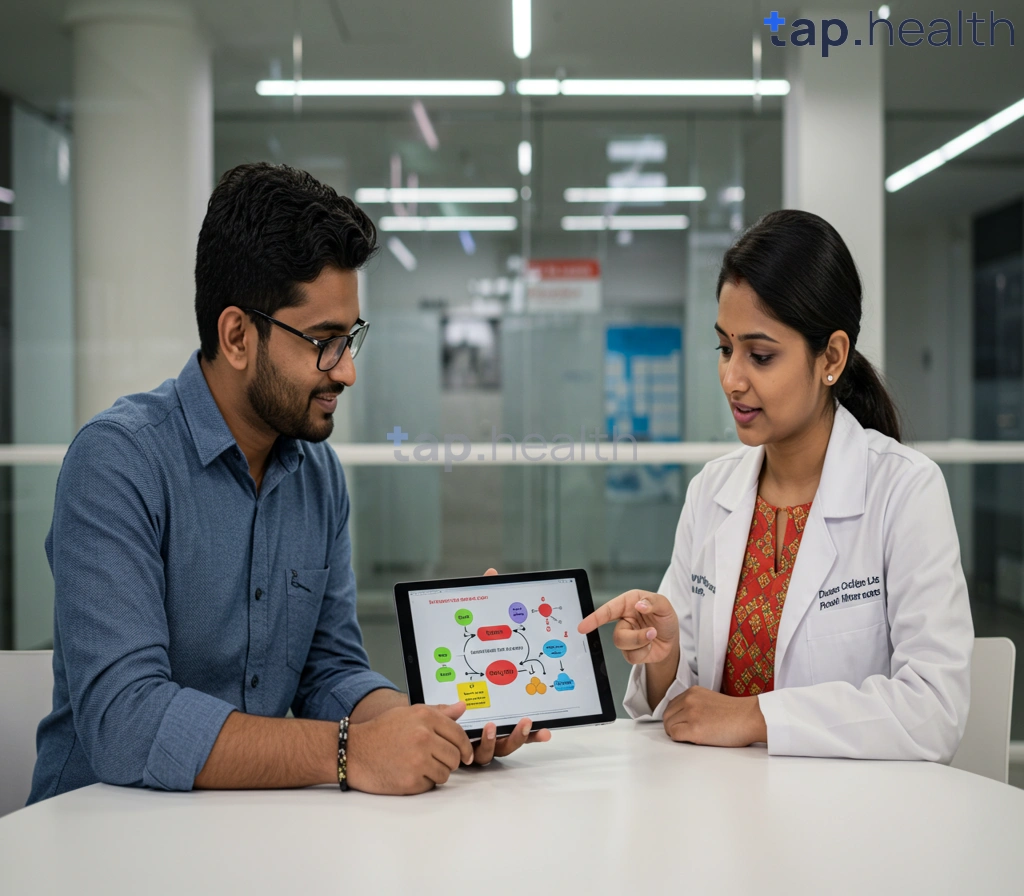Table of Contents
- Kidney Pain with Diabetes: When to See a Doctor?
- Diabetes and Kidney Pain: Recognizing the Warning Signs
- Is Your Kidney Pain Related to Diabetes? Find Out Now
- Diabetes-Related Kidney Disease: A Guide to Early Detection
- Managing Diabetes and Kidney Pain: Expert Advice and Support
- Frequently Asked Questions
- References
Living with diabetes can present many challenges, and one of the most concerning is the potential for kidney problems. Experiencing diabetes and kidney pain can be alarming, leaving you wondering when a trip to the doctor is absolutely necessary. This blog post is designed to help you understand the connection between diabetes and kidney pain, clarifying the symptoms that warrant immediate medical attention and offering insights to manage your health effectively. We’ll explore the warning signs you shouldn’t ignore and empower you to make informed decisions about your care. Let’s dive in and learn how to proactively protect your kidneys.
Kidney Pain with Diabetes: When to See a Doctor?
Diabetes significantly increases your risk of developing kidney disease, a serious complication known as diabetic nephropathy. Nearly 30% of people with diabetes will eventually develop this condition, highlighting the importance of early detection and management. Experiencing kidney pain alongside diabetes is a serious warning sign that requires immediate medical attention. In India and other tropical countries, access to timely healthcare can be challenging, making early recognition crucial.
Recognizing the Symptoms
Kidney pain associated with diabetes isn’t always easily identifiable. It can manifest as a dull ache in your lower back or sides, sometimes accompanied by swelling in your legs and feet, or changes in urination frequency or volume. Persistent fatigue, nausea, and loss of appetite can also be indicators of diabetic nephropathy. Don’t ignore these symptoms, especially if you have diabetes. Early diagnosis and treatment can significantly slow the progression of kidney disease and prevent irreversible damage.
Seeking Medical Help
In India and tropical countries, access to quality healthcare varies. However, prompt medical attention is vital. If you experience any kidney pain alongside your diabetes, consult a doctor immediately. Early intervention through regular check-ups, blood tests (including checking for GFR – Glomerular Filtration Rate), and urine tests can help monitor kidney function and prevent further complications. Don’t hesitate to seek advice from a nephrologist specializing in kidney disease. Your proactive approach can make a significant difference in protecting your kidney health. Managing diabetes effectively is also crucial, and you might find our article on Which Diabetes Drug is Best for Diabetics with Kidney Disease? helpful. While this article focuses on kidney pain related to diabetes, it’s important to note that kidney pain can stem from other conditions. For instance, you might find the following article useful if you are also experiencing other health issues: Does Hypothyroidism Cause Kidney Stones?
Diabetes and Kidney Pain: Recognizing the Warning Signs
Diabetes, a prevalent health concern particularly in India and other tropical countries, often presents with subtle symptoms. A staggering 50% of diabetes cases worldwide remain undiagnosed, according to the International Diabetes Federation, highlighting the critical need for awareness. One such often-overlooked symptom is kidney pain. This pain can manifest in various ways, from a dull ache in the lower back or sides to sharp, stabbing sensations. Ignoring these warning signs can lead to serious complications.
Understanding the Connection
Kidney pain associated with diabetes stems from diabetic nephropathy, a condition where high blood sugar damages the kidneys’ filtering units (nephrons). This damage can cause inflammation, leading to pain and potentially irreversible kidney failure. The pain may be accompanied by other symptoms like swelling in the legs and ankles, changes in urination frequency (increased or decreased), foamy urine, and persistent fatigue. These symptoms are particularly concerning in individuals with a family history of diabetes or kidney disease. Recognizing these early signs, as discussed in 10 Early Signs and Symptoms of Diabetes?, is crucial for timely intervention.
Seeking Immediate Medical Attention
If you experience persistent kidney pain, especially alongside other symptoms mentioned above, it’s crucial to seek immediate medical attention. Early diagnosis and treatment of diabetic nephropathy can significantly slow its progression and help prevent serious long-term complications. In India and tropical regions, access to timely healthcare can be a challenge; therefore, proactive monitoring of blood sugar levels and regular check-ups with a physician are paramount. Don’t delay seeking help; your kidney health is vital. Early intervention is key to managing diabetes and protecting your kidneys. As you age, managing diabetes becomes even more critical, and understanding the specific challenges involved is important. For further insights, refer to Managing Diabetes as You Age: Challenges and Solutions.
Is Your Kidney Pain Related to Diabetes? Find Out Now
Kidney pain can be a debilitating symptom, and for individuals with diabetes, it’s a particularly serious concern. In India, and many tropical countries, a significant comorbidity exists between diabetes and hypertension. The alarming statistic that over 60% of people with diabetes in India also have hypertension highlights the critical link between these conditions and potential kidney complications. This high prevalence underscores the importance of early detection and proactive management of kidney issues for those living with diabetes in these regions.
Understanding the Connection
Diabetes damages blood vessels over time, including those in your kidneys. This damage can lead to diabetic nephropathy, a serious condition where your kidneys lose their ability to filter waste effectively. Symptoms can range from mild discomfort to severe, persistent pain in your lower back or sides. Other warning signs include swelling in your feet and ankles, changes in urination frequency, and fatigue. Ignoring these symptoms can have severe consequences, leading to kidney failure and the need for dialysis or a kidney transplant. Understanding how Does Insulin Affect Kidneys? is crucial for managing this condition effectively.
When to Seek Immediate Medical Attention
If you have diabetes and experience persistent or worsening kidney pain, it’s crucial to seek medical attention immediately. Don’t delay – early intervention is key to preventing irreversible damage. In India, access to healthcare varies, so it’s important to find a qualified nephrologist or diabetologist to get a proper diagnosis and treatment plan tailored to your specific needs. Regular check-ups, including blood and urine tests, are vital for monitoring kidney function and managing your diabetes effectively. Early detection and management can significantly improve your quality of life and prevent more serious complications. Don’t hesitate to contact your doctor or a local specialist if you have any concerns. It’s also important to be aware of other potential complications, such as Can Diabetes Cause Erectile Dysfunction?.
Diabetes-Related Kidney Disease: A Guide to Early Detection
Understanding the Risks
Diabetes significantly increases the risk of developing kidney disease, a serious complication affecting millions globally. Early detection is crucial, especially considering that a substantial portion of those with diabetes falls within the 20-64 age group (61%, source), representing a large and active workforce in many Indian and tropical countries. Symptoms might be subtle initially, making regular check-ups vital. This is particularly important in regions with limited access to healthcare, where early intervention can make a significant difference.
Recognizing the Warning Signs
Persistent kidney pain, swelling in the feet or ankles, changes in urination (increased frequency or reduced volume), fatigue, and persistent nausea can all be indicators of diabetic kidney disease. These symptoms aren’t exclusive to kidney problems, but their presence, especially in individuals with diabetes, warrants immediate medical attention. Don’t ignore these warning signs. In hotter climates, dehydration can exacerbate kidney issues, making regular hydration particularly important for individuals with diabetes in Indian and tropical countries.
Seeking Timely Medical Care
Regular blood and urine tests are essential for monitoring kidney function in people with diabetes. These tests can detect early signs of kidney damage long before symptoms appear. Early diagnosis and treatment are critical for slowing the progression of the disease and preventing long-term complications. If you experience any of the mentioned symptoms, consult a nephrologist or your primary care physician immediately. Early intervention offers the best chance for managing this serious condition effectively.
Taking Proactive Steps
For individuals in Indian and tropical countries, access to timely healthcare can be a challenge. Therefore, proactive steps like maintaining a healthy diet, regular exercise, and effective diabetes management are crucial in preventing or delaying the onset of kidney disease. Educate yourself and your family about the risk factors and symptoms. This is especially important in understanding the progression of the disease; learning about What is Stage 1 Chronic Kidney Disease? can be a crucial first step. This proactive approach can significantly improve your long-term health outcomes. Understanding the stages of kidney disease allows for better management and can help in preventing further complications. For instance, knowing more about What is Stage 1 Chronic Kidney Disease? can empower you to take control of your health.
Managing Diabetes and Kidney Pain: Expert Advice and Support
Understanding the Connection Between Diabetes and Kidney Pain
Diabetes significantly increases your risk of developing kidney disease, often manifesting as kidney pain. High blood sugar damages the tiny filters in your kidneys (glomeruli) over time, leading to diabetic nephropathy. This damage can cause pain, often felt in the lower back or sides, alongside other symptoms like swelling, fatigue, and changes in urination. Early detection and management are crucial to slow or prevent further kidney damage. In India and other tropical countries, where diabetes prevalence is high, understanding this connection is paramount.
Managing Blood Pressure: A Key Factor
Controlling your blood pressure is vital in preventing kidney damage. For people with diabetes, maintaining blood pressure below 140/90 mmHg, or ideally below 130/80 mmHg as some guidelines recommend, is crucial. Regular monitoring and medication, as prescribed by your doctor, are essential. This is especially important in tropical climates, where certain conditions can exacerbate high blood pressure. Ignoring high blood pressure can accelerate kidney damage and intensify pain. Effective management of diabetes is key to controlling blood pressure, and you can find helpful tips in our guide on 10 Proven Tips to Effectively Manage Diabetes.
Seeking Timely Medical Attention in India and Tropical Countries
Experiencing persistent kidney pain alongside symptoms like frequent urination, foamy urine, or swelling warrants immediate medical attention. In India and other tropical nations, access to quality healthcare varies. Proactive engagement with your healthcare provider is key – regular check-ups, blood and urine tests, and adherence to prescribed medication can significantly impact your kidney health and reduce pain. Don’t delay seeking help; early intervention is the best defense against serious complications. Consult your doctor or a nephrologist to discuss your specific needs and develop a tailored management plan. For more comprehensive strategies to manage your diabetes, check out our blog on 10 Proven Tips for Effective Diabetes Management.
Frequently Asked Questions on Diabetes and Kidney Pain
Q1. What is the link between diabetes and kidney pain?
Diabetes significantly raises your risk of diabetic nephropathy, a kidney disease that can cause lower back or side pain, swelling, fatigue, and changes in urination.
Q2. How can I reduce my risk of developing kidney problems due to diabetes?
Managing your diabetes effectively, keeping your blood pressure below 130/80 mmHg, and regularly consulting a nephrologist or diabetologist are crucial. Regular blood and urine tests are also vital for monitoring kidney function.
Q3. What are the early warning signs of diabetic nephropathy that I should watch out for?
Pay attention to lower back or side pain, swelling in your body, unusual tiredness (fatigue), and changes in how often you urinate. Don’t ignore any of these symptoms.
Q4. How important is early detection and treatment of kidney problems related to diabetes?
Early detection is crucial to prevent irreversible kidney damage. Prompt medical attention and regular checkups are vital for managing the condition and avoiding complications.
Q5. I live in a region with limited healthcare access. What steps can I take to manage my diabetes and protect my kidneys?
Proactive health management is key. Even with limited access, effective diabetes management and blood pressure control remain paramount. Seek out available healthcare resources and prioritize regular checkups when possible.
References
- A Practical Guide to Integrated Type 2 Diabetes Care: https://www.hse.ie/eng/services/list/2/primarycare/east-coast-diabetes-service/management-of-type-2-diabetes/diabetes-and-pregnancy/icgp-guide-to-integrated-type-2.pdf
- What is Diabetes: https://www.medschool.lsuhsc.edu/genetics/docs/DIABETES.pdf




